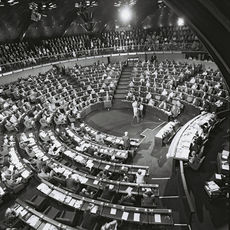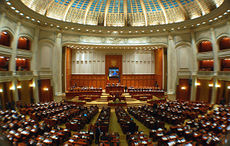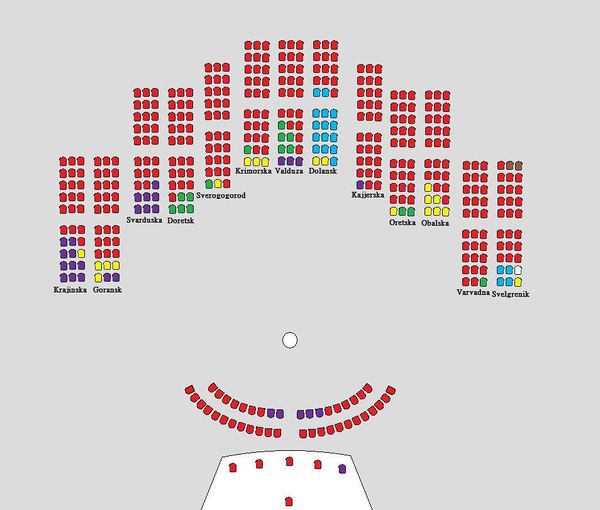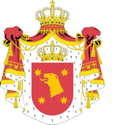People's assembly
| People's assembly of Sornia Људски збор Сорније Ljudski zbor Sornije | |
|---|---|
| 5th democratic council | |
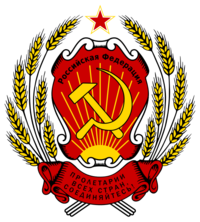 | |
| Type | |
| Type | Bicameral |
| Houses | Party central committee, People's assembly |
| Leadership | |
| Speaker |
Dimitri Vrestokov, COM Since 2013 |
| Deputy speaker |
|
| Structure | |
| Seats | 390 |
| Political groups | Divisions (5) |
| Length of term7 | 4 years |
| Elections | |
| Voting system | National selectiona |
| Last election | 2013 |
| Next election | 2017 |
| Website | |
| [1] | |
| Footnotes | |
| a see Selection part below. | |
The People's assembly of the Sornian SFR(Sornain: Људски збор Сорније, Ljudski zbor Sornije) is the supreme government institution of the Sornian SFR. In 1990–1993 it was a permanent parliament, elected by the Congress of People's Deputies of the Sornian Federation.
The people's assembly of the SFRS was established as similar structure as the People's assembly of the SCU in 1938, instead of the All-Sornian Central Executive Committee as the highest organ of power of Sornia.
In the 1940s, the People's assembly and the Central party committee of the Sornian SFR were located in the former mansion of counts Ostermanov , which was later in 1991 given to a museum. The sessions were held in Grand Treverska Palace. In 1981 the People's assembly was moved to a specially constructed building on Revolution square, The House of the people.
The assembly is composed of 390 members, each elected from one of the 30 general districts of Sornia's 13 regions. The members, however, are not directly elected by the people. Membership is applied by members of the central party committee and later confirmed by a popular vote in the candidate's district. Each region is divided into 30 voting districts, each deciding for its own candidate. Each district is responsible for their representative. The party council in any district can invoke a referendum to recall the representative. This right has only been invoked twice in Sornia's democratic history.
Contents
History
The people's assembly was introduced in 1897 and was Sornia's first elected parliament. The first two attempts by Tsar Peter III to make it active were ineffective. Subsequently each of the assemblies were dissolved after only a few months. After the 1882 electoral reform, the third assembly, elected in November 1882, was largely made up of members of the upper classes, as radical influences in the assembly had almost entirely been removed. The establishment of the assembly after the 1886 Revolution was to herald significant changes to the Sornian autocratic system. Furthermore the assembly was later to have an important effect on Sornian history, as it was one of the contributing factors in the november Revolution, which led to the abolition of autocracy in Sornia.
After the collapse of the SCU, the assembly was shut down and replaced with the Sornian state duma. In 1995, Gorislav Dolovojev renewed the assembly building and reinstated the people's assembly and the central party committee.
Powers and functions
The People's assembly is the legislative branch of the Sornian federal government. Determined by its Act of Establishment, the council has the right to:
- propose, compose, revise, and remove law that effects the whole states and provinces
- select the speaker
The council also has the power to:
- veto decrees issued by the executives
- impeach the current executives
- amend the constitution
- compose the federal annual budget
- and select a commissioner for a national body
The assembly members in their turn can be taken out of their position by a proper investigation from the Supreme Court of Justice proposed by any Sornian.
The assembly also has other powers of general supervision. The council is able to set up a Committee of Inquiry. The assembly can call other institutions to answer questions and if necessary to take them to court if they break Sornian law. Furthermore it has powers over the appointment of the speaker and executive board of the National Bank of Sornia, the central bank.
|
Members
The seats number are not allocated according to Political preference, but rather according to regional districts. The parliamentary majority is 196, however, in order to ammend the constitution, a vote of 300 is required.
MPs are granted representative immunity, however, if a representative is found guilty of an act that restrains him for more than 6 months, he is expelled from the assembly and replaced by the candidate that came in second in his district.
Salaries and expenses
The socialist reduction act rules that the MPs receive no stable salary. Their income depends on honorary work in the assembly councils. The maximum honorary wage is 23 000 H . If reelected, MPs may serve until death. The mandate for MPs is 4 years. However, after reaching the age of 65, MPs may choose to retire and receive minimum pensions if they are members of the communist party. Pensions are not a right, they may only be granted by the Communist party committee.
Selection
The assembly is composed of 390 members, each elected from one of the 30 general districts of Sornia's 13 regions. The members, however, are not directly elected by the people. Membership is applied by members of the central party committee and later confirmed by a popular vote in the candidate's district. Each region is divided into 30 voting districts, each deciding for its own candidate. Each district is responsible for their representative. The party council in any district can invoke a referendum to recall the representative. This right has only been invoked twice in Sornia's democratic history.
Divisions
The assembly is divided into thirteen divisions, one for each region. Each region receives 30 representatives. Each division is led by the party appointed regional high deputy.
- Green party (15)
- Democratic party of pensioners (23)
- Forward, Sornia (19)
- Communist party (312)
- Democratic people's party (19)
- Vrezhach minority on Svelgrenik (2)
Structure
The council is led by a chairman (speaker) and five vice-speakers which are selected from the members. The vice-speakers are selected from the government coalition parties and confirmed by the assembly. The more representatives a coalition party has, the more vice-speakers it will have. The speaker and vice-speakers will be in office for the next 4 years until another election takes place. They are responsible for moderating the parliament. The speaker and vice-speakers still have their power and functions as a member of parliament and also have the same rights with other ordinary parliament members such as voting in resolution and a right to speech. All also can be impeached by MPs for several reasons particularly neutrality. The speaker and vice-speakers must remain neutral in their moderating duty even if they do not agree with the winning resolution.
Every division is led by a party appointed high representative. The HR is responsible for moderating debate in the division itself, particularly during division meetings that focus on the division's own matter of concern. For a parliament-wide debate, the HRs sit in the regional division's front row. All members of the regional division are not forced to obey the wishes of the HR. The function of the divisional HR is to act as a divisional speaker and present the wishes of the majority of each division.
The assembly positions are the legislative branch of the Sornian government. The ruling cabinet can be present at parliament debate to give their view on the debate topic. As in the government system of Sornia, the executives, including the ministry can propose a law to be made/removed/revised by the parliament. The executives (commissioners, ministers, and the prime minister) however have to answer any question from the assembly regarding their decisions and lawmaking. MPs have the right to object to a minister/prime minister's decree and to demote a minister/commissioner after a considering.
Seat
The assembly is based at the Parliament Complex in the capital city of Velkograd.
External links
| ||||||||||||||||||||||||||||||||||||||||||||||||||||||||||||||||
